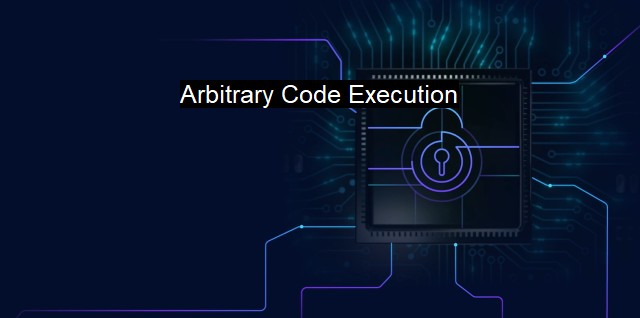What is Arbitrary Code Execution?
Arbitrary Code Execution (ACE): Countering the Highly Sophisticated Cyber-Attacks Targeting Vulnerabilities in Programs and Systems
Arbitrary Code Execution (ACE) is a common method of attack used by malicious actors in the world of computer security and the cyber sphere. Primarily, it involves the introduction of extraneous or foreign code into a computer's program or system. Once in the system, the code provides the attacker with the capability to manipulate the existing system or software architecture and commandeer control. this results in the attacker obtaining the privilege to access and control resources without explicit authorization.Malware or virus is a typical entity used to launch an Arbitrary Code Execution attack. Attackers can create a malware, virus, or make use of Command Injection, Buffer overflows, or data corruption methods to instigate an ACE. In some typical scenarios, a simple user action such as reading a strategy guide, watching an online video, or executing unexpected sequences of operations may trigger these targeted attacks.
Exploiting the loopholes and vulnerabilities of a system or software often realize arbitrary code execution attacks. By finding a glitch or security lapse in a software application or a computer system, powerful attacks perform invasive operations and fool the system to execute foreign code. Frequently, these security lapses occur from faults in a program's source code or a poorly designed architecture, indicative of a lack of security emphasis in certain elements' design phase.
An example illustrating this concept is an attacker installing a backdoor by trigger ACE on an online marketplace web server. The attacker may consequently collect customer identification information, credit card data, manipulate product pricing, or launch a Distributed Denial of Service (DDoS) attack from the compromised server. Over time, ACE has taken center-stage in significant cybersecurity breaches witnessed in large multinational companies. System and database infiltrations induced via Arbitrary Code Execution have produced substantial financial and reputation damages to these organizations.
Generally, avoiding Arbitrary Code Execution breaches requires a mix of preventive and protective cybersecurity measures. There's an increasing reliance on robust antivirus programs with better malware detection capabilities, comprehensive firewalls, and regular system and software patch updates. Efforts geared towards identifying potential vulnerabilities & glitches during the design and development phase of a software application are also pivotal. Regular security auditing, threat hunting, and vulnerability assessment exercises also help deter ACE.
In the context of antivirus software, a potent remedy against arbitrary code execution is the heuristic-based detection feature. Many next-generation antivirus solutions employ heuristics to detect new, unknown viruses or malware based on their behavior. If an application or a piece of code tries to execute suspicious activities or display behavior resembling an Arbitrary Code Execution, the antivirus isolates that program and does not allow it to interact with the operating system, thereby averting possible harm.
As the human element presents an equally significant aspect of cybersecurity, user vigilance is decisive in escaping malicious attacks too. Ignoring anonymous hyperlinks, maintaining distance from untrusted programs, timely updating of systems, and antivirus programs could prevent important steps to ward off hackers' attempts to launch ACEs.
The battle between attackers attempting to achieve arbitrary code execution and defenders aiming to prevent it is a continually evolving chess match. A delicate cat-and-mouse game played on the mine-laden field of cybersecurity, with each side employing more sophisticated approaches in their attempts. Reinforced security measures, like secured programming environments, system hardening, investing in potent antivirus tools, and endorsing robust incident response mechanisms, signify few plausible paths to follow. Yet, it remains incumbent upon entities to sustain constant vigilance and equip themselves with updated knowledge about evolving cyber-threat techniques including ACE.

Arbitrary Code Execution FAQs
What is arbitrary code execution in cybersecurity?
Arbitrary code execution refers to a type of security vulnerability where an attacker can execute arbitrary code or commands on a target system. This vulnerability can be exploited to install malware, steal sensitive data, or take control of the system.How does antivirus protect against arbitrary code execution?
Antivirus software typically uses a combination of signature-based detection and behavior-based detection to protect against arbitrary code execution. Signature-based detection involves identifying known malicious code or patterns in the code. Behavior-based detection involves monitoring the behavior of the code and identifying any suspicious activity.What are some common methods for exploiting arbitrary code execution vulnerabilities?
Some common methods for exploiting arbitrary code execution vulnerabilities include buffer overflow attacks, SQL injection attacks, and cross-site scripting attacks. In these attacks, the attacker typically injects malicious code into a vulnerable application or system, which is then executed by the system.How can arbitrary code execution vulnerabilities be mitigated?
Arbitrary code execution vulnerabilities can be mitigated by implementing secure coding practices, keeping software up to date with the latest security patches, and using security tools such as firewalls and intrusion detection systems. Additionally, organizations can conduct regular vulnerability assessments and penetration testing to identify and address potential vulnerabilities before they can be exploited.| | A | | | B | | | C | | | D | | | E | | | F | | | G | | | H | | | I | | | J | | | K | | | L | | | M | |
| | N | | | O | | | P | | | Q | | | R | | | S | | | T | | | U | | | V | | | W | | | X | | | Y | | | Z | |
| | 1 | | | 2 | | | 3 | | | 4 | | | 7 | | | 8 | | |||||||